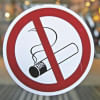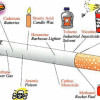Quit smoking and reclaim your life
It's hard to stop smoking. Understanding what immediately happens to your body when you stop smoking, however, will help you kick that habit to the curb for good.
The moment you put down your cigarette, your body is already going through positive changes. Just 20 minutes after you quit, your heart rate will return to normal. After two hours, both your heart rate and blood pressure levels will return to normal — and this is when the nicotine begins to fade out of your system.
Your withdrawal symptoms typically begin between two and 12 hours after your last cigarette, and this is, admittedly, the hard part. Nicotine withdrawal will usually reach its peak about three days after you quit, meaning you'll experience headaches or nausea, as well as crabbiness. However, at this point the carbon monoxide levels in your blood will have dropped back to normal.

After that, if you can defeat the cravings, you have only good things to look forward to: one to nine weeks after quitting, your coughs, shortness of breath, or burning lungs during physical activity will begin to decrease. Years later, your risk of heart disease as well as your risk of various cancers (including lung cancer) will be half that of a smoker's risk.
Fifteen years after stopping your smokes, your risk of heart disease is equivalent to that of non-smokers. And if you stop smoking before the age of 30, you're very likely to live the life of someone who has never smoked before — unless you've smoked extensively and done irreparable damage to your lungs that can lead to chronic obstructive pulmonary disease (COPD).
Putting down the cigarette affects each of your individual body parts, too.
YOUR BRAIN
Cigarettes release "feel-good" chemicals in your brain, having an effect on you that is similar to addictive drugs like heroin. The increased release of these opioids is what makes it so difficult to quit. "It appears that smokers have an altered opioid flow all the time, when compared with non-smokers, and that smoking a cigarette further alters that flow by 20 to 30 percent in regions of the brain important to emotions and craving," David J. Scott, an author of the study examining smoking's effect on the brain, said in a news release. Removing nicotine from the bloodflow — which typically occurs several days after you stop smoking — will ultimately alter the opioid flow in your brain, and gradually your brain's chemicals will return to normal. Once you get past the hurdle of initial cravings and withdrawal, your brain won't be reliant on those chemicals to feel good.
YOUR LUNGS
Lungs have this amazing tendency to regenerate rather quickly. Right after you quit, your airways begin to see a decrease in inflammation, and the cilia — little hair-like things that line them — begin to work again after a smoke-induced paralysis. Cilia, which act as the lungs' cleaning system, begin repairing themselves just days after you stop smoking and can return to their normal function in a few months' time.
"Paradoxically, people find that they cough a little more right after they stop smoking, but that's natural," Laura Blue wrote in Time magazine. "That's the lungs cleaning themselves out."
YOUR HEART
Quitting smoking is a more effective way to lower your risk for heart disease than common medications like aspirin, beta-blockers, statins, and ACE inhibitors, according to the National Heart, Lung, and Blood Institute at the NIH. The moment you quit smoking, your heart and blood vessels begin to improve, lowering your chance for heart attacks.
YOUR TEETH
Nicotine stains your teeth, so when you stop smoking, you have a chance to improve their whiteness and strength. Your bad breath, stinking of smoke, will also repair itself into something a bit more neutral. Because tar coating your teeth creates a "film" of sorts, bacteria are more likely to settle there and cause tooth decay. Once you stop smoking, you may need to go through an oral hygiene routine to begin scraping away some of the tar on your teeth. Brush and floss twice a day, and drink plenty of water.
YOUR SKIN
"Your skin reflects your lifestyle and what you eat and drink," Dr. Andrew Carmichael told Net Doctor. Indeed, smoking has an effect on your skin — increasing your risk for eczema, and speeding up the aging process. The harmful toxins that enter your body through cigarettes include carbon monoxide, tar, formaldehyde, hydrogen cyanide, ammonia, mercury, lead, and cadmium — and these all restrict blood flow to the skin and even break down elasticity structures in the skin, like collagen and elastin. This is how smokers' skin wrinkles so easily.
Though some of the skin damage is permanent, stopping smoking will immediately improve the blood flow and hydration to your skin, making it more full and youthful looking. Drinking plenty of water after smoking cessation will help to get your skin back on track. The processes that lead to extra wrinkles will slow down or stop once the toxins are out of your body. Likewise, if you have bags under your eyes from lack of sleep, removing the smoke from your routine could improve your sleep cycles, according to a Johns Hopkins study.
So don't give up just yet. You have better looks and fuller health to look forward to.
The article was originally published on Apr 23, 2014

 For all latest news, follow The Daily Star's Google News channel.
For all latest news, follow The Daily Star's Google News channel. 








Comments